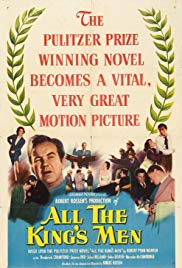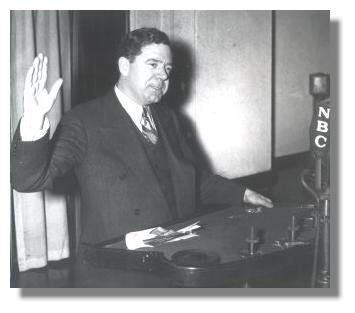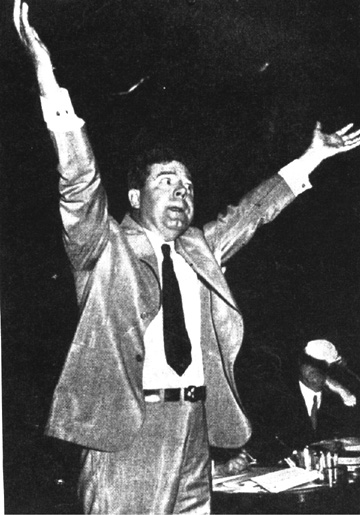All state employees were required to remit a percentage of their salaries, up to 20% for managerial employees, as “voluntary” donations to the Long political organization. Contractors with the state were required to “donate” 20% of the gross amount of each government contract that they received. Long began as a champion of the people, but he became a symbol of corruption.
Long, fearful of assassination, was protected by the “Cossacks” a group of bodyguards, many of them little better than thugs. There are some who contend that Long died because of a ricocheting bullet fired by one of his bodyguards.
Huey Long’s good roads and free books did not lift Louisianians from the mire of poverty or protect them from the ravages of the Great Depression. There were many who questioned the sincerity of Long’s assaults on big business and his commitment to the welfare of the common man. Taxes on businesses favored by Long went down during his tenure. At the same time, taxes on small property holdings went up. Long associated closely with several business leaders whose companies profited from government contracts or which were regulated by the state. Some analyses of the condition of the common people in Louisiana showed that child labor increased and that the general standard of living decreased, often in ways that were not traceable to the Great Depression or that could have been corrected by state government. But under Huey Long, the state government did nothing.
In the early 1930s, Long’s political power was beginning to be felt outside Louisiana. He spoke to large and enthusiastic crowds in the South and Midwest. He intervened dramatically and successfully in several elections in other states. The best example is Arkansas in 1932. In 1931, Hattie Caraway had been appointed to the U.S. Senate to complete the term of her deceased husband. An election to that Senate seat for a full six-year term was scheduled for 1932. When Caraway announced that she would run in the Democratic Primary, she had no organization and no money. Before that time, no woman had been elected to the U.S. Senate for a full term. Six men were already in the race, and Caraway was expected to come in close to last. However, she had been one of the few senators who had supported Long’s proposals for placing a limit on personal income and family fortunes. Long campaigned for Caraway across Arkansas. As a result Caraway won the election and was the first woman elected to the Senate for a full six-year term.
At the 1932 Democratic Convention, Long kept the wavering Mississippi and Arkansas delegations in the FDR camp. This support was crucial to securing the nomination. However, Roosevelt did not reward Long for his efforts, and in fact, Long’s national ambitions were limited and then opposed by Roosevelt. FDR told his associates that they could laugh at Huey Long all they wanted, but he was actually one of the two most dangerous men in America. The other, continued Roosevelt, was Douglas MacArthur. Roosevelt used federal patronage in Louisiana to reward Long’s enemies and launched an IRS investigation of Long and his associates.
As a prelude to the 1936 national elections, Long organized “Share the Wealth” clubs all over the country. He claimed that his clubs had more than five million members. Long used his Senate office to administer the clubs and received more mail than all other members of the Senate combined. Confidential polls taken on behalf of Roosevelt showed that Huey Long, had he run in the 1936 election, could have polled 6,000,000 votes, enough to hold the balance of power between the Republican and Democratic candidates.
The author of a well respected biography of Long that appeared shortly after his death stated that Long
provided a:
… lesson in American politics that should be studied, memorized, and utilized. He was well on his way to becoming America’s first dictator. Perhaps he was only a bubble flashing on a stormy sea. But his popularity, his power, his rapid rise, were the result of a deep malady in American life that has not disappeared because Huey Long disappeared.
Huey Long was, in many respects, an obnoxious human being. He boasted; he berated; he intimidated. He had a penchant for publicly humiliating his associates, including his hand picked successor for governor. If he were eating with members of his entourage, he would pick the choicest morsels of food from their plates. When he was drunk, he was worse, picking food from the plates of anyone around him.
Long was fatally wounded by gunfire in the Louisiana State House in 1935. At the time it was thought that he was assassinated by Dr. Carl Weiss, the son-in-law of one of the few sitting judges who was not subservient to Long. The night of the shooting, Long had pushed through legislation to gerrymander the judge’s district and prevent his re-election. Long had reviled the judge in his public statements and it was rumored that Long was about to charge that the judge’s family, which would have included Weiss’ wife and his infant son, had some black ancestors. At that time in Louisiana, such a charge would have led to the ostracism of the family. After the shooting, Weiss was hailed as a hero by many. However, Weiss’ family always contested the claim that Weiss killed Long and a strong case can be made that Long was killed by ricocheting bullets of his trigger-happy bodyguard.




